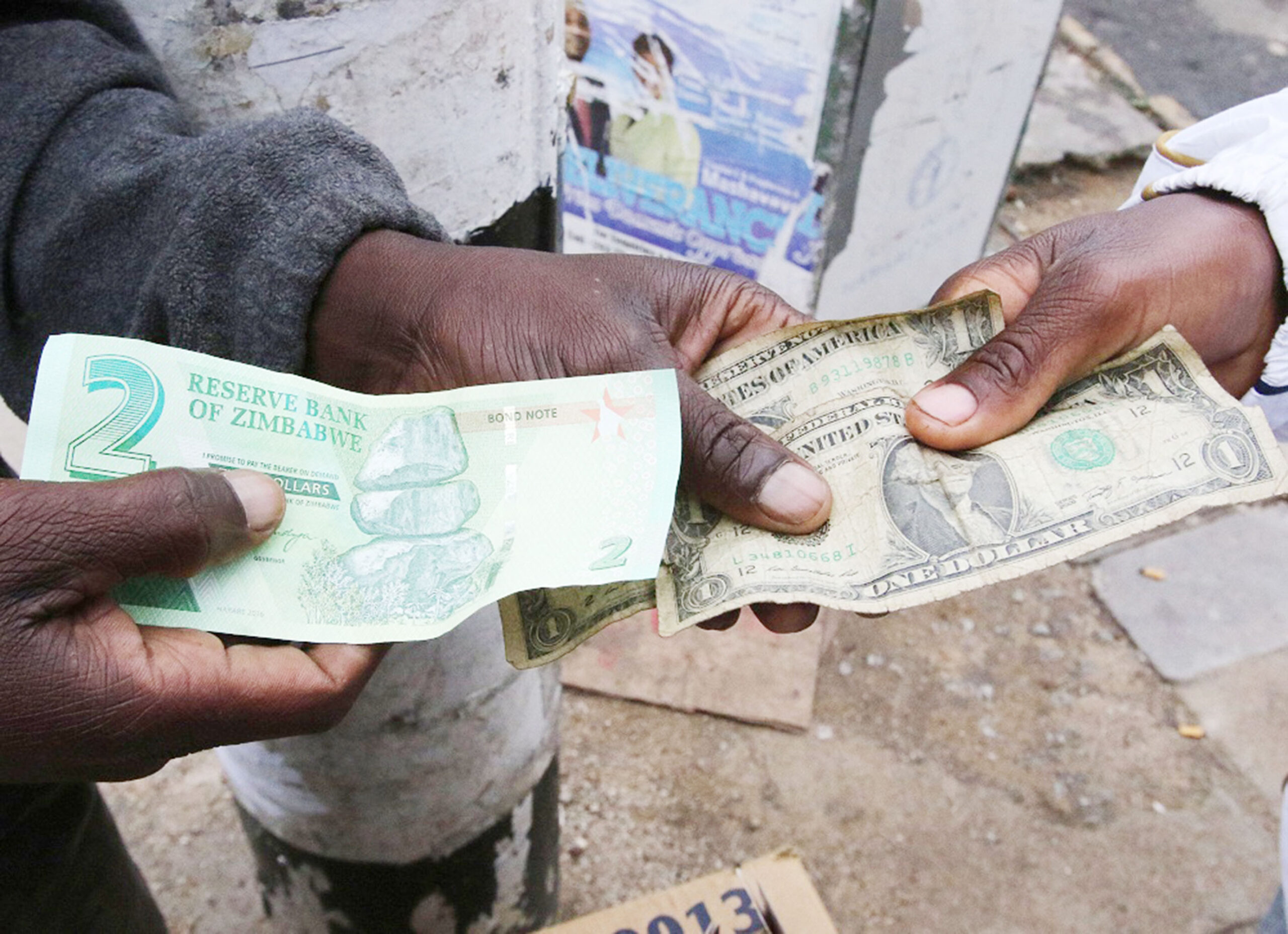Dollarisation frustrating value, demand for local currency
THE increasing dollarisation of the economy has created a dilemma for traders who are now forced to pay for goods upfront in United States dollars, thereby frustrating demand for local currency usage, amid concerns over the recent weakening of the local dollar, especially on the parallel market, retailers have said.
With nearly 70 percent of domestic transactions now done in forex, according to ZimStat, several businesses now prefer the use of the US dollar citing its strength as a medium of strong value preservation when compared to the shifting local currency exchange rate.
Market observers say the adoption of the dual currency system by the monetary authorities, while it promotes market liberality and price discovery, has tended to frustrate incomes and spending power for ordinary people, a majority of whom are paid in local currency.
Zimstat
Recently, there has been widespread consumer outcry over the latest spate of price increases, amid galloping exchange rate volatility, especially on the parallel market.
While the official exchange rate is pegged at around US$1:$1 070 as of yesterday, most retailers have pegged their prices beyond that mark, with a loaf of bread costing $1 750 on average.
In some instances, the illegal forex dealers have now pegged the exchange rate at $2 200 for a US dollar, further weakening incomes as most businesses tend to index their prices on parallel market rates despite getting cheap forex from the official platform.
Treasury has since warned that Government will not hesitate to tighten monetary measures to deal with the resurgent speculative parallel rates, as this poses a serious threat to market stability and tends to frustrate economic gains achieved so far.
This is despite the successful implementation of policy measures to foster price and exchange rate stability in the economy.
Since the beginning of the year, inflation rates had tumbled from a peak of 30,7 percent monthly in June 2022 to less than one percent from January to March this year. ZimStat has since reported that the cost of living has risen by 11 percent in the month of April alone due to the recent price volatility.
Confederation of Zimbabwe Industries president Mr Denford Mutashu said the latest exchange rate movement is forcing retailers and wholesalers to follow market trends, which unfortunately sideline the use of official rates as businesses suffer losses when procuring products from suppliers.
“The current legislated exchange rate makes it impossible for retailers and wholesalers to procure products as most of the suppliers are now demanding upfront payment before delivery of goods and more than 70 percent of the economy has already dollarised,” said Mr Mutashu in an interview.
“There is a need to create demand for local currency because for sure we need our own money. So, we call upon the Government to come up with policies, which will create demand for the Zimbabwean dollar.”
Industry and Commerce Minister, Dr Sekai Nzenza
Industry and Commerce Minister, Dr Sekai Nzenza, could not comment on the matter as she directed questions to the ministry’s head of commerce Dr Douglas Runyowa, who also said he will seek clearance before responding.
The Consumer Council of Zimbabwe (CCZ) has accused manufacturers and distributors of conniving to frustrate end users and has made reference to the recent artificial shortages of sugar in some shops.
Where the product was available, it was only sold in forex and in limited quantities but the same product will be in abundant supply in the parallel market.
A mini-survey conducted by Business Chronicle on Monday revealed that some big supermarkets had no stocks while some had only 1kg, which were being sold for $2 199. The price for 2kgs was hovering between US$2,50 to US$2,90 or ZWL$4 600 to ZWL$4 800.
An official at one of the supermarkets said they last had sugar stocks two weeks back and only received 10 cases, which only lasted for a day.
Dr Douglas Runyowa
“Meanwhile, vendors and illegal tuck-shops are selling sugar for between US$2,20 and US$2,40 and only accept forex.
Government has allowed retailers to sell their goods using the official exchange rates with 10 percent forward pricing.
Commenting, CCZ regional manager Mr Comfort Muchekeza said the artificial shortage of products like sugar is being created by the distribution chain, which starts from the producer to the retailer.
He said the supply chain is not being honest to consumers after sugar producers said they have adequate stocks.
“If you check from Tongaat Hulett, their records indicate that they have enough sugar for the nation and even at the ministry level, they are issuing exports licences, which include sugar exports, because the understanding is that the country has enough reserves for sugar and there is no problem in exporting the excess,” said Mr Muchekeza.
“So, I think the retailers or the producers are not being honest with us. Sugar is a basic need and it should be available and affordable because the current prices are out of reach for many consumers.
“It’s not only price but the preferred currency from Hulett, for quite some time there have been challenges over the purchase of sugar in local currency where most retail outlets would sell all other products in local currency except for sugar.
Prof Mthuli Ncube
“So, I think this is an issue that needs to be looked into again and say why sugar, which is also a basic need and not imported, is being strictly sold in US$ in some of the retail outlets or from the supplier.”
Mr Mutashu concurred that as a basic commodity and a fast-moving product restocking sugar was problematic due to currency value changes.
“Unfortunately, because it’s got to be paid for upfront before delivery, most shops are struggling with liquidity to replenish stocks. It’s a vicious cycle and the legislated exchange rate makes it impossible for retailers to procure the product in USD and sell in local currency at the prescribed exchange rate,” he said.
Responding to questions, Tongaat Hulett corporate and industry affairs executive Dr Dahlia Garwe said there were no sugar shortages in Zimbabwe.
“We actually carried over stock from the last season into the new season. We sell sugar through the formal retail and wholesale channels and sell in both currencies in line with the dual currency pricing regime,” he said.
Vice President, Dr Constantino Chiwenga
“As our retail and wholesale customers are independent business entities, we have no control over how they, in turn, sell the sugar we will have sold to them and in what currency.”
Last week, Vice President, Dr Constantino Chiwenga and Finance and Economic Development Minister, Professor Mthuli Ncube, spoke strongly about the issue while engaging delegates during the Zimbabwe International Trade Fair (ZITF) International Business Conference in Bulawayo.
Although transitory in nature given the rising demand for foreign currency as a store of value in response to rising foreign currency inflows in the economy, Dr Chiwenga said wild parallel market rates have no justification.
Responding to the same issue, Prof Ncube said the domestic economy has performed well despite external shocks and reiterated that key fundamentals were stable with no justification for speculative behaviour by market players.
He, however, said the spike in the parallel rate in the past few weeks will compel the Government to take drastic measures to tame the scourge and protect consumers while preserving gains achieved so far.
ZITF
When the parallel rates rose astronomically last year, the Government raised bank interest rates to 200 percent but reduced these in response to business lobbying when it observed cross rates had stabilised.
“I did say that we have responded to inflation domestically by raising interest rates.
“The interest rates have been quite high and of late we had started bringing down the interest rate. But I’m now wondering about the recent hike in the exchange rates in other markets. Should I increase the interest rates?
“Please stop pushing that parallel market, because what we will do is increase the interest rates to 200 percent and beyond,” Prof Ncube warned.
“Because that is what we know, so desist from operating in that market and pushing up the parallel rate. It is because this is very costly to everyone.” —.-chronicle.co.zw








